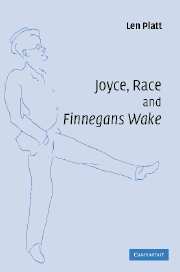Book contents
- Frontmatter
- Contents
- List of abbreviations
- 1 Joyce, race and racism: introduction
- 2 ‘No such race’: Finnegans Wake and the Aryan myth
- 3 Celt, Teuton and Aryan
- 4 ‘Our darling breed’: the Wake, social Darwinism and eugenics
- 5 Atlanta-Arya: theosophy, race and the Wake
- 6 ‘Hung Chung Egglyfella’: staged race in Ulysses and the Wake
- 7 ‘And the prankquean pulled a rosy one’: filth, fascism and the family
- 8 Race and reading: conclusion
- Notes
- Index
6 - ‘Hung Chung Egglyfella’: staged race in Ulysses and the Wake
Published online by Cambridge University Press: 22 September 2009
- Frontmatter
- Contents
- List of abbreviations
- 1 Joyce, race and racism: introduction
- 2 ‘No such race’: Finnegans Wake and the Aryan myth
- 3 Celt, Teuton and Aryan
- 4 ‘Our darling breed’: the Wake, social Darwinism and eugenics
- 5 Atlanta-Arya: theosophy, race and the Wake
- 6 ‘Hung Chung Egglyfella’: staged race in Ulysses and the Wake
- 7 ‘And the prankquean pulled a rosy one’: filth, fascism and the family
- 8 Race and reading: conclusion
- Notes
- Index
Summary
A fascination with racial identity is both configured and undermined in the Wake, where a pervasive desire for storytelling is obsessed with origins but endlessly defeated. The Western identity is manifest not least through the astonishing exercise of this genealogical imperative, and its decisive failure to ‘find’ itself in terms of beginnings. Outside of white Europe, however, has no such representation, in the Wake or elsewhere in Joyce's fiction. Although the racialisation of his work in terms of its ‘Irishness’, or engagement with England and Europe, has been standard in critical tradition since the earliest days of Joyce criticism, constructing the ‘black’ Wake or the ‘Oriental’ Wake would seem to be an unlikely critical objective, because Africa, the ‘East’ and their respective diasporas do not feature as subject formations in Joyce's fiction. The idea of the racial Other is clearly important, as is the idea of the exoticised ‘East’. From the Dubliners story ‘Araby’ to the Wake, the latter is, indeed, a highly significant locus for Joyce, denoting, among other things, romantic escape. But representation here is invariably framed in terms of fantasy and the alterities by which the centre attempts to define itself. This is so even in the complex case of Leopold Bloom where stinginess, strangeness, outsider status, and so on are characteristics ascribed to him by other Dubliners, not essentialist markers of his ‘race’.
- Type
- Chapter
- Information
- Joyce, Race and 'Finnegans Wake' , pp. 121 - 145Publisher: Cambridge University PressPrint publication year: 2007
- 1
- Cited by



